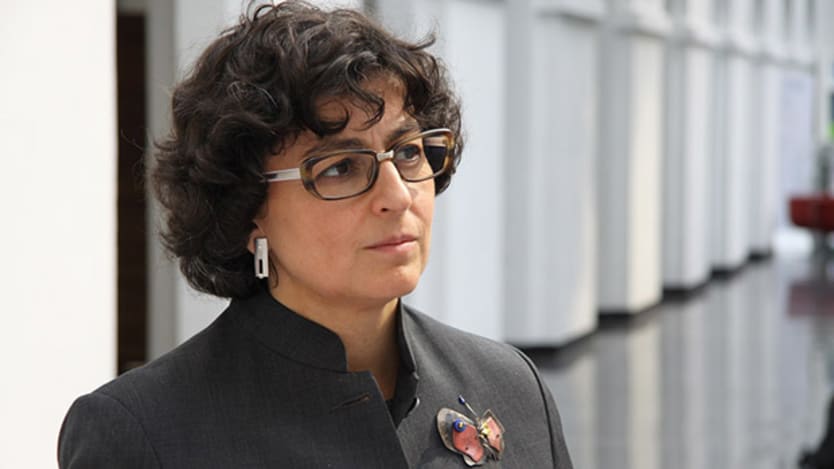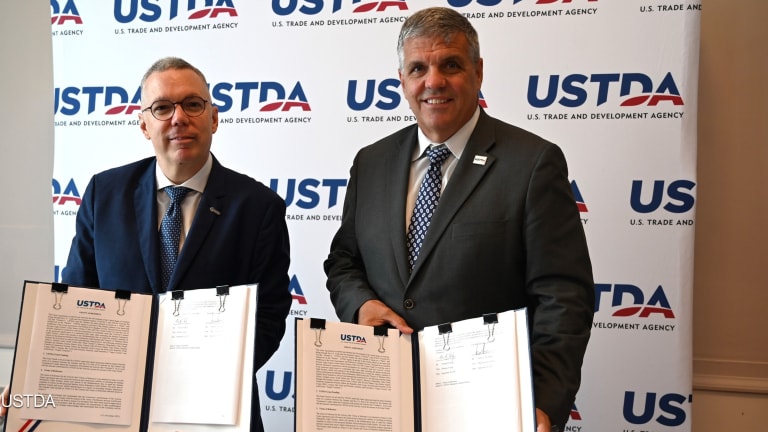
Women constitute a majority of the world’s poor. In fragile states and post-conflict societies, the percentage of women living in poverty is even higher. Traditionally, poverty among women has been more prevalent in rural societies, but in recent decades, there has been a significant rise in poverty among women in urban areas.
There is an urgent need to find sustainable solutions that put money in the hands of women, to ensure that they play a bigger part in trade and poverty eradication. We know that women re-invest close to 90 percent of their income in their families and communities, compared with 40 percent in the case of men. The economic empowerment of women is therefore pivotal to poverty reduction and sustainable growth.
The International Trade Centre helps women entrepreneurs and women in export-oriented value chains to gain greater economic benefits from their participation in trade.
Through our Women and Trade Program, we assist women entrepreneurs — in particular those in poorer communities — in achieving export success. A strong focus is placed on supporting women-owned small and medium-sized enterprises in developing countries, since SMEs are the main source of jobs worldwide. In fact, across the developed and the developing world, SMEs account for almost 80 percent of jobs. According to the International Finance Corp., one-third of these SMEs are owned by women.
Helping women in developing countries to succeed in business requires interventions in multiple areas. In many sectors, women producers are isolated, often working in remote rural areas with little or no connection to networks that provide access to information about good agricultural practices and pricing, as well as savings and loans facilities. This is why we support women’s organizations and networks — such as the International Women’s Coffee Alliance — that allow members to pool expertise and resources. We also believe that by building the capacity of women entrepreneurs to understand and meet buyers’ requirements, more businesswomen in developing countries are able to link to local, regional and global markets. By offering guidance to governments on setting targets on sourcing from women-owned businesses as part of their procurement spending, the number of public contracts going to women is now increasing. Still, women’s share of the global procurement market is currently a dismal 1 percent.
Our Women Vendors Exhibition and Forum brings together buyers and sellers from selected sectors to bolster trade between women entrepreneurs of developing countries and corporate, government and institutional organizations. In just over two years, more than 650 enterprises from more than 50 countries have participated in the forum and women entrepreneurs have conducted business transactions to the value of more than $20 million. This year’s WVEF will take place in Kigali, Rwanda, on Sept. 16–17, providing a great opportunity to source from women entrepreneurs from across the world.
But given the complexity of international trade, simply setting up meetings between buyers and sellers is not enough. Further assistance is needed to build suppliers’ capacities to understand and meet buyers’ requirements. Even for entrepreneurs who have been successful in their domestic markets, the additional requirements to export can be confusing not only in terms of what is required, but also in understanding which agency is responsible for issuing documentation and at what cost.
ITC works through a network of women’s businesses, associations and government agencies to demystify matters such as certificates of origin, border procedures, negotiation of international contracts and trade finance. Through ITC’s Standards Map, an online database that enables users to explore and compare more than 120 voluntary sustainability standards worldwide, entrepreneurs are trained to navigate the numerous certifications that may apply to the goods that they export.
Through our Women and Trade Program, which extends from Africa to the Middle East and across to the Asia-Pacific region and to Latin America, we work to unlock the export competitiveness of women SMEs in sectors such as coffee, cotton, textile and clothing. And at WVEF, where most of the buyers and sellers team up, we have been very encouraged. As a result of WVEF, some members of the International Women’s Coffee Alliance have sold more than 5,000 kilograms of coffee to Wal-Mart, the U.S.-based supermarket chain, through Full Circle Exchange, a U.S.-based nongovernmental organization. IWCA has also sold coffee to the Philippines to Accenture, the management consultancy, and is now in negotiations with a major international hotel chain.
ITC’s Women and Trade Program is about partnerships to ensure that women entrepreneurs have a fair chance at succeeding in business. WEConnect International and Vital Voices, two U.S.-based NGOs, are examples of partners with whom we work closely to build women’s capacity to sell. They, too, have an extensive network of businesswomen around the globe, particularly in Latin America and the Caribbean, and together we help women entrepreneurs access new markets.
Given their reach, multinational companies also play an important role in ensuring the success of women entrepreneurs in developing countries. Technology giant IBM is one such partner of the Women and Trade Program. By participating in WVEF, IBM has diversified the pool of suppliers which feeds into its supply chain. While helping the companies it sources from to grow, IBM is also assisting women-owned businesses to expand. By doing that, the IT firm remains faithful to the commitment it adopted under the Global Compact Women’s Empowerment Principles to source from women entrepreneurs.
We have now embarked on Phase II of our Women and Trade Program, which runs from 2014 to 2016, working with our partners around the world to make a vital contribution in enabling women entrepreneurs to understand and succeed in formal business processes. We will continue to focus on the economic empowerment of women as the bedrock on which to build more inclusive and just societies. We can achieve this with the generous support of many governments around the world to make a difference by focusing a greater part of their development aid to women entrepreneurship. As the United Nations family discusses the post-2015 development agenda, ITC’s Women and Trade Program makes for a convincing case of why and how development aid can have a positive impact on socio-economic transformation to better lives.
Want to learn more? Check out She Builds and tweet us using #SheBuilds.
She Builds is a month-long conversation hosted by Devex in partnership with Chemonics, Creative Associates, JBS International as well as the Millennium Challenge Corp., United Nations Office for Project Services and U.K. Department for International Development.








